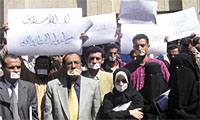
Pressure from journalists and international organizations help Thabet’s releaseFreedom of press defended [Archives:2004/719/Front Page]
March 11 2004
 |
The Sana'a Western Court ordered on Monday the release of journalist Saeed Thabet, who was detained last Friday accused of publishing “false information” on the assassination attempt of Colonel Ahmad Ali Abdullah Saleh.
Thabet, 39, correspondent for Quds Press Agency and a member of the newly elected board of the Yemeni Journalists Syndicate (YJS) was, according to a statement of the YJS, kidnapped by agents of the Political Security Organization (PSO) after returning from the mosque on Friday with his 3-year old son. The intelligence officers refused even to let him bring home son. After the first session, which was held among a huge crowd of journalists, Judge Mohammed Abdulqader ordered the release of Thabet, whose hearing resumed yesterday.
Colleagues come to the rescue
About thirty lawyers who volunteered to defend Saeed and more than 300 journalists overwhelmed the observers and prosecutors when they stepped forward for his defense, carrying banners denouncing the arrest and trial and putting stickers on their mouths to express their anger at the harassment the media has suffered in the country. The trial session witnessed a heated debate between the defense lawyers (Mohammed Allow, Abdulaziz al-Samawi and Ahmad al-Wadee) and the prosecution, as the lawyers demanded that the court hold the intelligence officers accountable for kidnapping a member of the YJS board and putting him in jail for two days. The lawyers even attacked the prosecution, who interrogated Thabet on Sunday evening after his release from the PSO and ordered that he should be imprisoned until he appears in court the other day.
They even appealed to the court to set free the mobile phone of the journalist, which was taken by the intelligence officers from his house as they considered it an evidence of “the crime”. The prosecution said that Thabet published false information with the aim to destabilize the safety and peace of the country. Thabet denied from the beginning the charge and said he published the denial. He said that the source of the news was Jordan. His agency supported his argument and authorized Mohammed Allaw to file a case against the intelligence for kidnapping its reporter, whom they said is a highly professional man.
Reporters Without Borders helps
Meanwhile the worldwide 'Reporters Without Borders' urged that the case against the journalist accused of “spreading false news” be dropped. It called on Judge Mohammad Ismail Adbel Kader of the Sanaa court to drop the case against journalist Thabet, who is accused of “spreading false news damaging to public interest and security.”
“The arrest of a journalist and his detention for 72 hours as if he were a criminal are serious and unacceptable violations of press freedom,” said the international press freedom organisation.
“Now is the time to put right these mistakes and drop all charges against this journalist and also to offer assurances to the rest of the profession, which will have been intimidated by the use of such methods. The press law should also be amended in consultation with journalists' professional organisations to abolish prison terms for press offences,” Reporters Without Borders added.
The organisation pointed out that it was the second arrest of a journalist in Yemen in less than a month. On 24 February Najeeb Yabli, of the Daily Al-Ayyam, was questioned for around 12 hours by the Aden Political Security Services in the south of the country for writing that the politics of the Yemeni President and that of the United States were only “two sides of the same coin”.
Hunger strike initiated
Saeed told Yemen Times after his release that he went on hunger strike and refused to reply to any questions before he was referred to prosecution, as his arrest was illegal. “Spreading false news” is a civil, not criminal, offence. In a statement issued on Sunday evening, the YJS called all journalists and international human rights NGOs to stand by Thabet and refuse his trial, which is illegal.
In its statement issued on Sunday, the National Authority for Defending Rights and Freedoms appealed to President Saleh to set the journalist free and that the press and publication prosecution should deal with the issue as with others. It said that there should be no big fuss about the issue because it is related to the son of the President, as Yemen is not a Monarchy in which people can not talk about the members of the royal family. It stated its wish that Saleh would take the initiative to abolish the jail penalty of journalists, as President Mubarak has done in Egypt. Journalists have started to discuss the idea and collect signatures of journalists demanding Saleh to take this step.
Political observers believe that the strong pressure and solidarity journalists showed towards their friend is a major reason behind his release. Of course, the international NGOs were of great help in this regard.
——
[archive-e:719-v:13-y:2004-d:2004-03-11-p:front]


